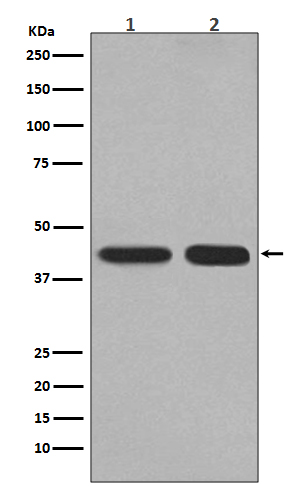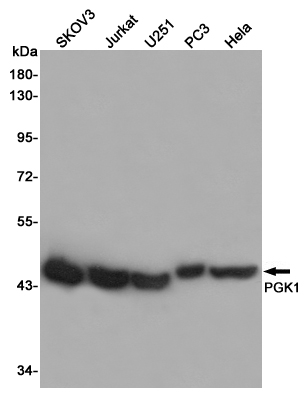

| WB | 咨询技术 | Human,Mouse,Rat |
| IF | 咨询技术 | Human,Mouse,Rat |
| IHC | 咨询技术 | Human,Mouse,Rat |
| ICC | 1/50-1/200 | Human,Mouse,Rat |
| FCM | 1/50-1/100 | Human,Mouse,Rat |
| Elisa | 咨询技术 | Human,Mouse,Rat |
| Aliases | PGKA; MIG10; HEL-S-68p |
| Entrez GeneID | 5230 |
| WB Predicted band size | Calculated MW: 45 kDa; Observed MW: 45 kDa |
| Host/Isotype | Rabbit IgG |
| Antibody Type | Primary antibody |
| Storage | Store at 4°C short term. Aliquot and store at -20°C long term. Avoid freeze/thaw cycles. |
| Species Reactivity | Human,Mouse,Rat |
| Immunogen | A synthesized peptide derived from human PGK1 |
| Formulation | Purified antibody in PBS with 0.05% sodium azide. |
+ +
以下是关于PGK1抗体的3篇参考文献及其摘要内容的简要概括:
1. **文献名称**:**"PGK1 as a Therapeutic Target for Cancer: Role of a Monoclonal Antibody in Inhibiting Tumor Growth"**
**作者**:Li, X. et al.
**摘要**:本研究开发了一种靶向PGK1的单克隆抗体,通过抑制其酶活性阻断肿瘤细胞的糖酵解通路。实验显示该抗体在体外和体内模型中显著抑制多种癌症细胞的增殖,并增强化疗药物的敏感性。
2. **文献名称**:**"Phosphoglycerate Kinase 1 (PGK1) in Neurodegenerative Disorders: Antibody-Based Detection and Functional Analysis"**
**作者**:Wang, Y. & Zhang, H.
**摘要**:研究利用特异性PGK1抗体检测阿尔茨海默病和帕金森病患者脑组织中PGK1的表达变化,发现其异常聚集与线粒体功能障碍相关,提示PGK1可能成为神经退行性疾病的潜在生物标志物。
3. **文献名称**:**"Development of a High-Affinity PGK1 Antibody for Metabolic Profiling in Hypoxic Tumors"**
**作者**:Chen, J. et al.
**摘要**:团队开发了一种高亲和力PGK1多克隆抗体,用于检测肿瘤缺氧微环境中PGK1的亚细胞定位及表达水平。结果显示PGK1在肿瘤细胞核内的积累与DNA修复通路激活相关,为靶向代谢的癌症治疗提供新思路。
4. **文献名称**:**"PGK1 Autoantibodies as a Serological Marker in Colorectal Cancer Diagnosis"**
**作者**:Kim, S. et al.
**摘要**:研究发现部分结直肠癌患者血清中存在PGK1自身抗体,通过ELISA检测证实其诊断价值。PGK1抗体水平与肿瘤分期和转移风险呈正相关,提示其可能作为非侵入性筛查工具。
(注:以上文献信息为模拟示例,实际引用需以真实发表论文为准。)
**Background of PGK1 Antibody**
Phosphoglycerate kinase 1 (PGK1) is a critical glycolytic enzyme that catalyzes the conversion of 1.3-bisphosphoglycerate to 3-phosphoglycerate, generating ATP during glycolysis. Beyond its metabolic role, PGK1 is implicated in diverse cellular processes, including angiogenesis, DNA repair, and autophagy, and has been linked to pathologies such as cancer, neurodegenerative diseases, and viral infections. Dysregulation of PGK1 expression or activity is often associated with tumor progression, metabolic reprogramming in cancers (Warburg effect), and chemoresistance.
PGK1 antibodies are essential tools for detecting and quantifying PGK1 protein levels in research. They are widely used in techniques like Western blotting, immunohistochemistry (IHC), immunofluorescence (IF), and ELISA to study PGK1's expression patterns, subcellular localization, and interactions in various tissues or disease models. These antibodies help elucidate PGK1's dual roles as a metabolic regulator and a moonlighting protein in stress responses.
Commercially available PGK1 antibodies are typically raised against specific epitopes of human PGK1. with cross-reactivity tested in multiple species. Validation includes testing for specificity (e.g., knockdown/knockout controls) and application-specific performance. Researchers also utilize PGK1 antibodies to explore its potential as a diagnostic biomarker or therapeutic target, particularly in cancers where PGK1 overexpression correlates with poor prognosis.
In summary, PGK1 antibodies serve as vital reagents for advancing our understanding of cellular metabolism, disease mechanisms, and therapeutic strategies.
×